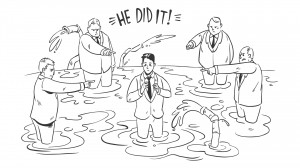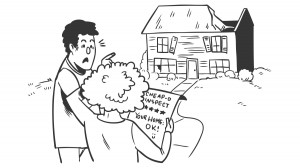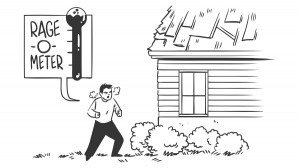One of the techniques that I stress in my home inspector training with the Law and Disorder Seminar for reducing one’s potential for being successfully sued is for home inspectors to strengthen their Pre-Inspection Agreements with clauses that narrow a claimant’s ability to bring a claim by designating contractually the exact circumstances under which the inspector will be amenable to suit.
One of those circumstances is the venue wherein a claim may be brought. As a home inspector, or any business performing services pursuant to a contract, you never want to be in any state or federal court. And for a myriad of reasons.
For one thing, in the context of a residential real estate inspection, any lawsuit is bound to involve multiple parties, a circumstance that is guaranteed to increase the cost and decrease the likelihood of resolution. For another, the cost for the plaintiff to get into court is low. Filing fees for plaintiffs are pretty modest. The cost to you to get out of court, on the other hand, will be quite high. Not only will you have the plaintiff to contend with but your fellow defendants, as well. And while the plaintiff may be very agreeable to letting you out of the suit, your fellow defendants, who will have filed their own cross-claims against you, may not be.
Most home inspectors of my acquaintance have already figured this out and, so, have clauses in their Pre-Inspection Agreements that mandate that all disputes arising from the inspection must be brought in Arbitration. If your client’s attorney has read his client’s Pre-Inspection Agreement, he knows that he will not be able to join you in with the seller, the seller’s agent and broker and his client’s agent and broker. He’ll have to prosecute the case in two separate venues, which he will be loathe to do. Especially if he has heard from me the manifold reasons why you have no liability.
(more…)
 A claim is brought against you after inspecting a vacant house, and your insurance company wants you to (surprise, surprise) settle it quickly and claim responsibility. However, you didn’t do anything wrong and instead want to fight the claim, but you are afraid your insurance company will bail if you don’t agree to settle.
A claim is brought against you after inspecting a vacant house, and your insurance company wants you to (surprise, surprise) settle it quickly and claim responsibility. However, you didn’t do anything wrong and instead want to fight the claim, but you are afraid your insurance company will bail if you don’t agree to settle.
 I remember the advice I received from a savvy real estate investor as I was about to purchase my first house.
I remember the advice I received from a savvy real estate investor as I was about to purchase my first house. By the time a home inspector contacts me, he or she has already made exhaustive attempts to explain to an irrational client why a leak in a roof six months after it was reported as “near the end of its life expectancy” in an inspection report is not grounds for a claim against the home inspector.
By the time a home inspector contacts me, he or she has already made exhaustive attempts to explain to an irrational client why a leak in a roof six months after it was reported as “near the end of its life expectancy” in an inspection report is not grounds for a claim against the home inspector.